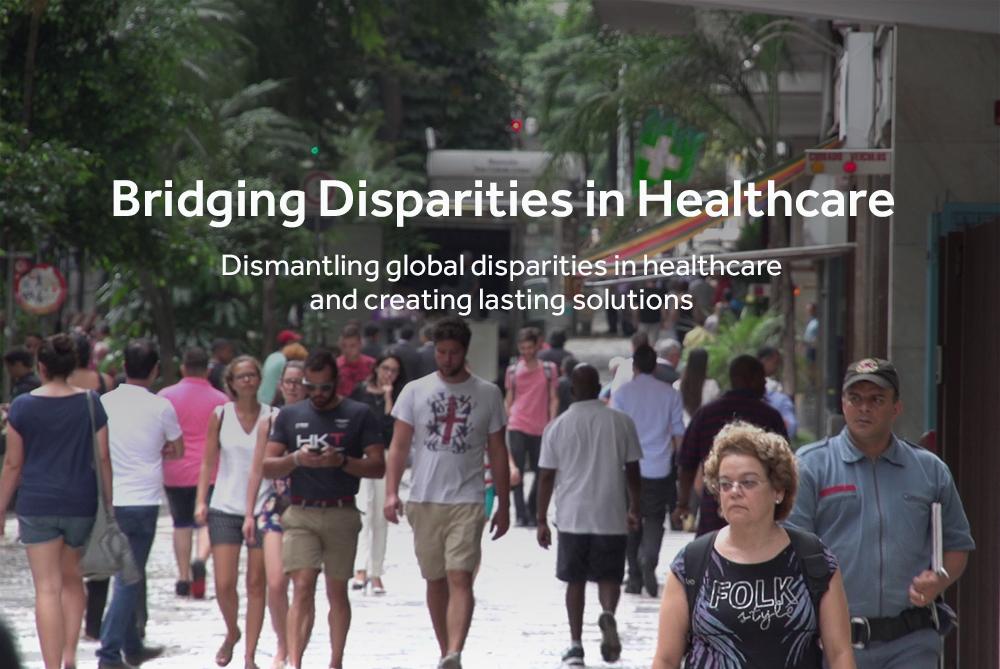Bridging Disparities in Healthcare
Dismantling global disparities in healthcare and creating lasting solutions

Bridging Disparities in Healthcare
It is 1992 in Mexico City, and Dr. Luis Molina is struggling to help his cardiovascular patients. Thirty percent of his neighbors lack money to pay for basic needs, and with other socioeconomic factors at play, some patients are left on a seemingly endless pacemaker waitlist. When a Medtronic representative heard Dr. Molina’s story, a product donation and medical training opportunity blossomed into a 25-plus year program that has served more than 3,000 patients. Product donations are one way to bridge access barriers, but our approach to dismantling global disparities in healthcare goes much deeper. By increasing diverse representation and reducing bias in how we develop, distribute, and connect patients to our technologies, we can help create global, lasting solutions.
Representing the Underrepresented
Medical teams that understand the nuances surrounding a patient’s health and life circumstances are critical. According to the Harvard Business Review, Black Americans make up 13 percent of the U.S. population but only 4 percent of U.S. doctors and less than 7 percent of U.S. medical students. Studies show closing this representation gap, along with many others, could save lives.
As an industry, we must prioritize promoting equal career advancement, educating physicians and patients everywhere, and increasing access to science, technology, engineering, and math (STEM) and healthcare education for women and people of color. We work to make an impact on these issues through programs and initiatives like:
- Thurgood Marshall College Fund: This partnership brings together both the Medtronic Foundation’s financial resources directed at scholarships for low-income students pursuing STEM degrees at historically Black colleges and universities and the time and skills of our passionate Medtronic employees – deepening its impact.
- STEM Outreach for Kids: To help bring more diversity into STEM fields, we share knowledge, experiences, and expertise and host programs that inspire youth interest in STEM careers. These programs are hosted around the world, from Australia to America.
- Addressing Disparities in Cardiovascular Care: Black, Latinx, and Asian patients are less likely to get transcatheter aortic valve replacements — a procedure for heart valve disease — and are offered this minimally invasive option at abysmally lower rates. In response, we created a pilot program to engage healthcare and community leaders in four U.S. cities to identify and address barriers to access for these underserved patient groups.
- Diverse Representation in Global Clinical Trials: With a focus on both gender and racial and ethnic diversity, we’re increasing trial representations around the world and across the board to ensure our products benefit everyone who needs them.
Dismantling Bias in Diabetes Care
In underserved communities, the path to an insulin pump can be riddled with misinformation, sometimes leaving a patient’s care to guesswork. Is an insulin pump only the last option for severe cases? I’ve heard it’s better than shots, but how come my doctor didn’t recommend it? Because of this lack of understanding, Hispanic and Black people with diabetes have been shown to use technology at rates that are two times and three times less than their white counterparts.
As one action to address these disparities in health, Medtronic focuses on reducing bias through interventions in the diabetes care pathway. We are developing unconscious bias trainings to help doctors become better advocates for their patients — many of whom might speak a different language. This includes checklists for appointments that make sure all treatment options are clearly shared. We partner with diabetes centers that serve mostly Spanish-speaking patients and provide access to education, support materials, and classes in their language to help patients properly set up their technology.
In China, children with diabetes can be subject to restrictions in academics and employment, which can put the children at a disadvantage in terms of education and career opportunities. Through a program called “Flying Dreams,” we aim to dismantle those generational disparities in healthcare. We’ve offered scientific disease management, life guidance, and counseling to more than 12,000 families in order to help them do more than just survive.
Giving Our All to Those Who Need It Most
Navigating healthcare systems, knowing how to identify health problems, and understanding available treatment options shouldn’t be a luxury based on zip code. By uncovering disparities in healthcare, mitigating biases in research, and empowering health workforces around the world, Medtronic is committed to continuously identifying what we have the power to change — and then acting upon it.

